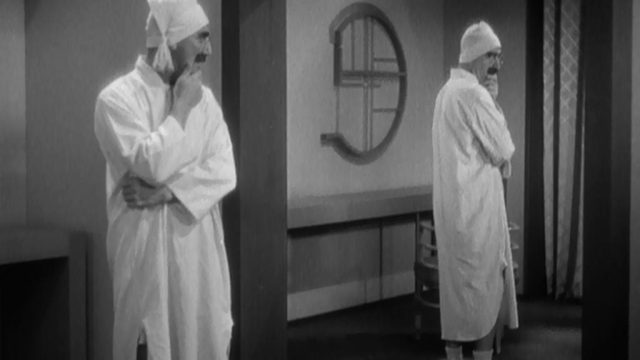One of my earliest media memories is discovering the Marx Brothers on television. There’d been a revival of interest in them at the time, and their movies became a staple of afternoon and weekend TV. The crazy gags, expert wordplay, and general anarchy were very appealing to a little kid. A lot of the fun was the interplay between the brothers, not to mention the indignities visited upon Margaret Dumont’s stoic Mrs. Teasdale courtesy of Groucho as Rufus T. Firefly. And of course, all the slapstick, which seemed like it was aimed at our age group.
The Marxes were sort of our comedy Beatles: Groucho was John, the smart one; Chico was Paul, the cute one; Harpo was George, the quiet one; and Zeppo was Ringo, the one everyone underestimated. Okay, it’s not a perfect analogy, but you get the gist. Just as I listened to the Beatles as much as I could, I watched Duck Soup every time it was on TV. I had it memorized so well I could tell where I was in the film by the gag onscreen and would be disappointed if, say, I’d missed Harpo’s Pinky putting his feet in the lemonade tank. We didn’t have DVRs yet, let alone VCRs; if you missed it, you had to wait until the next time the film was on. Fortunately, Duck Soup aired frequently, along with other Marx Brothers classics.
Speaking of all the gags in Duck Soup, one of my favorites is the obvious one: the mirror scene with Pinky and Rufus. While the concept didn’t originate with the Marx Brothers, their version has been oft-imitated, including by Harpo himself in an episode of “I Love Lucy.” The gag is deceptively simple: Pinky, dressed like Rufus, tries to fool him into thinking he’s looking at a mirror image and not an intruder. He has to anticipate every move Rufus will make as Rufus tries to trick Pinky into giving himself away. The ruse finally fails when Chico’s Chicolini shows up, also dressed like Rufus. I definitely recreated the scene myself with whoever I could talk into playing along.
Although Duck Soup lacks a couple of Marx Brothers movie staples – i.e., a musical interlude with Harpo playing the harp or Chico playing piano – it still has plenty of their zany antics. Rufus alternately romances and insults Mrs. Teasdale, yet she rolls with it all. Chicolini and Pinky are busy spying on Freedonia’s government (i.e., Rufus) for their bosses in rival Sylvania. Zeppo’s Lt. Bob Roland, Rufus’ secretary, provides a lot of the straight-man set-up to Rufus’ chaotic energy. There’s some musical setpieces, some intrigue, and a whole lot of hilarity. Just writing about it has me smiling and hearing “Hail, hail, Freedonia” in my head.
As I got older, Duck Soup showed up less and less on TV, but it still had a home in revival movie theaters. In college, I’d grab my best friend and off we’d go to see Duck Soup, or maybe some Laurel & Hardy shorts or some silent comedies, often accompanied by live music, and laugh ourselves silly. By then, there were VHS and Betamax players, and I taped Duck Soup off TV so I could watch it whenever I wanted. Of course, I’ve upgraded my copy since then. I also still have a poster for the Marx Brothers’ Animal Crackers I got from a revival showing. It’s framed and hanging on the wall. Several books about the Marx Brothers sit on my shelves.
And if I come across Duck Soup while channel surfing, I still stop everything I’m doing to watch it. Hail, hail, Freedonia forever.

